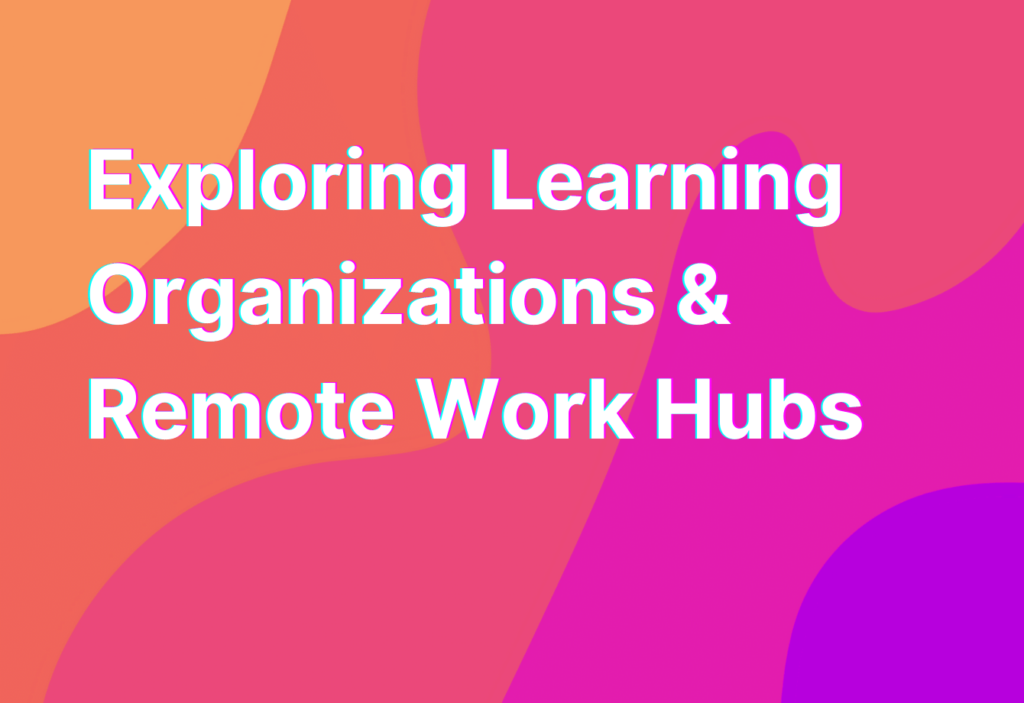Exploring Learning Organizations & Remote Work Hubs
Hey there, remote work enthusiasts! Today, we’re diving into the fascinating world of learning organizations and how they intersect with remote work hubs. If you’re curious about how remote teams can foster a culture of continuous learning and growth, you’re in the right place. So grab your favorite cup of coffee (or tea, if that’s your thing) and let’s get started!
What is a Learning Organization?
Before we delve into the connection between learning organizations and remote work hubs, let’s first understand what a learning organization actually is. In a nutshell, a learning organization is one that prioritizes and encourages the ongoing development of its employees. It’s a place where learning is not just an afterthought, but an integral part of the company’s DNA.
Learning organizations are characterized by a few key traits. They promote a growth mindset, where individuals are encouraged to embrace challenges and see failures as opportunities for learning. They also foster a culture of collaboration and knowledge sharing, where employees are empowered to contribute their unique perspectives and insights.
Now that we have a basic understanding of learning organizations, let’s explore how they can thrive in the remote work landscape.
The Rise of Remote Work Hubs
Remote work hubs, also known as coworking spaces, have been gaining popularity in recent years. These shared workspaces provide remote workers with a dedicated place to work, away from the distractions of home. They offer amenities like high-speed internet, comfortable seating, and even networking events.
But remote work hubs are not just about providing physical space. They also foster a sense of community and collaboration among remote workers. In these hubs, individuals from different companies and industries come together, creating opportunities for knowledge sharing and cross-pollination of ideas.
So, what happens when you combine the principles of learning organizations with the collaborative environment of remote work hubs? You get a powerful combination that can supercharge the growth and development of remote teams.
The Benefits of Learning Organizations in Remote Work Hubs
When remote teams operate within a learning organization framework, they can reap numerous benefits. Let’s take a closer look at some of these advantages:
- Continuous Learning: Remote workers in learning organizations have access to a wealth of resources and opportunities for growth. They can participate in online courses, attend webinars, and engage in mentorship programs, all while enjoying the flexibility of remote work.
- Knowledge Sharing: Remote work hubs provide the perfect environment for remote teams to connect and share their expertise. Whether it’s through informal conversations over coffee or organized knowledge-sharing sessions, remote workers can tap into a diverse pool of knowledge and experiences.
- Collaboration: Learning organizations emphasize collaboration and teamwork. Remote teams in these organizations can leverage the power of technology to collaborate effectively, using tools like Trello for project management or Slack for communication.
- Innovation: By fostering a culture of continuous learning and collaboration, learning organizations in remote work hubs can drive innovation. Remote workers are encouraged to think outside the box, experiment with new ideas, and contribute to the growth of their organizations.
- Employee Engagement: When remote workers feel supported and empowered to learn and grow, they are more likely to be engaged and satisfied with their work. This, in turn, can lead to higher productivity and better overall team performance.
As you can see, the combination of learning organizations and remote work hubs can create a powerful synergy that benefits both individuals and organizations. It’s a win-win situation!
Wrapping Up
And there you have it, folks! We’ve explored the concept of learning organizations and how they can thrive within the collaborative environment of remote work hubs. By embracing the principles of continuous learning, knowledge sharing, and collaboration, remote teams can unlock their full potential and drive innovation.
If you’re interested in learning more about the benefits of remote work hubs and debunking the multitasking myth, be sure to check out our article “Multitasking Myth: Debunking the Coworking Remote Work Hubs”. It’s a fascinating read that will challenge some common misconceptions about multitasking in the remote work context.
Until next time, keep learning, growing, and embracing the remote work revolution!


